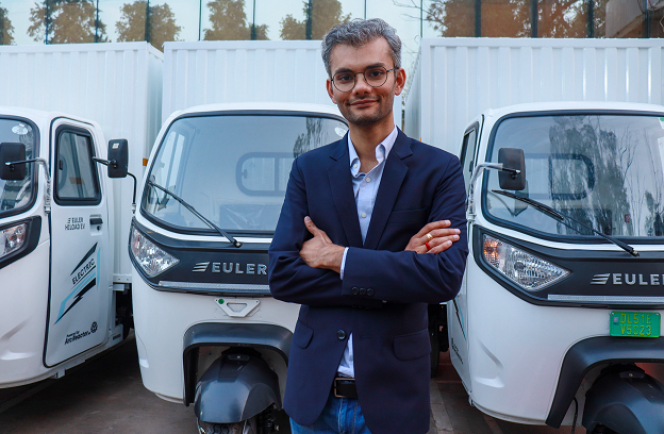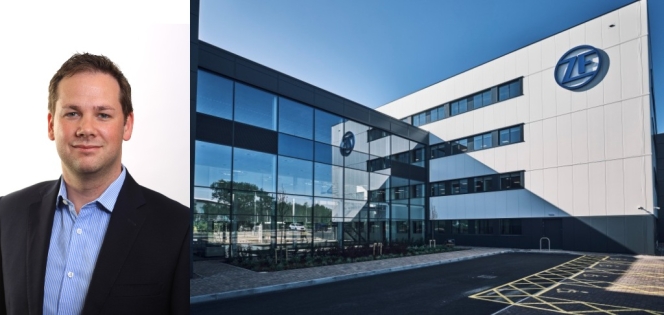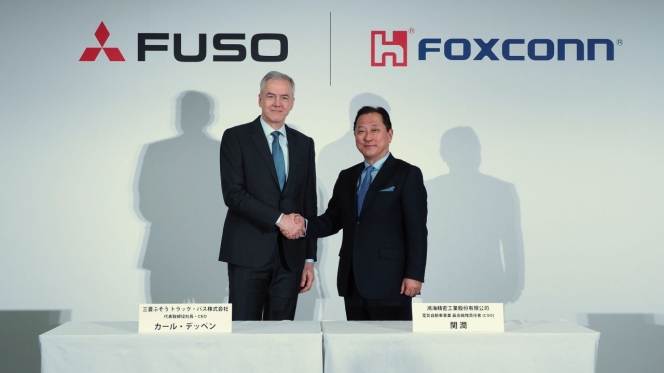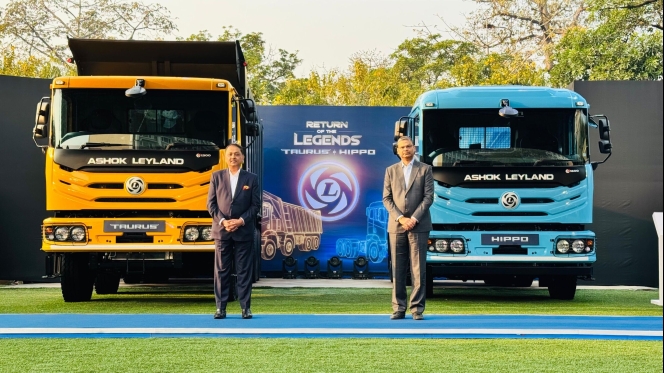- Euler Motors
- Series D
- Hero MotoCorp
- British International Investment
- BII
- Saurav Kumar
- StormEV
- HiLoad EV
- Dr Pawan Munjal
- Abhinav Sinha
Euler Motor Raises INR 6.38 Billion In Series D Led By Hero MotoCorp And BII
- By MT Bureau
- May 19, 2025

Delhi NCR-based electric vehicle company Euler Motors has raised INR 6.38 billion in Series D round, which was led by Hero MotoCorp and British International Investment (BII). With this, the EV maker has raised around INR 14 billion to date.
The company aims to utilise the fund towards expanding its sales & service network, and advancing new product development.
At present, the company’s product portfolio includes an electric three-wheeler the HiLoad EV and StormEV, the country’s first ADAS-equipped four-wheeler Light Commercial Vehicle (LCV).
Saurav Kumar, Founder & CEO, Euler Motors, said, “We are excited to welcome Hero MotoCorp as a strategic investor in Euler Motors. This is a strong vote of confidence both in India’s commercial electric mobility future and in Euler Motors’ execution and products. With this fresh capital and strategic backing from new and existing investors, we are poised to accelerate our scale, continue innovating to deliver superior products, and come a few steps closer towards becoming India’s No. 1 commercial EV brand.”
Dr. Pawan Munjal, Executive Chairman, Hero MotoCorp, said, “The strategic investment in Euler reinforces our commitment to accelerated growth through both organic and inorganic expansion, while highlighting the power of collaboration and adaptability in an ever-evolving market. As a global automotive leader, Hero MotoCorp is driven by sustainability, innovation and customer-centric progress. As we strengthen and diversify our presence in the emerging mobility landscape, this investment allows Hero MotoCorp to venture into a rapidly growing electric three and four-wheeler market, while unlocking adjacent business opportunities and continuing to cement its leadership in the future of sustainable mobility.”
Abhinav Sinha, Managing Director and Head of Technology, Telecoms and Sustainable Industrials, British International Investment, said, “We are pleased to deepen our partnership with Euler Motors as it scales its operations and brings next-generation EVs to more people in India. Since our initial investment in 2023, Euler Motors have advanced e-mobility adoption and created better jobs. This aligns closely with our ambition to support India’s net zero emissions target and enables us to drive scalable impact in a sector vital to both economic growth and environmental progress.”
Some of the key investors at Euler Motors include Blume Ventures, Athera Partners, Asian Development Bank Ventures, and Piramal Alternatives India Access Fund.
Jake Morris Succeeds Bal Panaser To Lead ZF’s UK R&D Hub
- By MT Bureau
- January 26, 2026

German technology company ZF Group has appointed Jake Morris as the Site Leader for ZF Hub UK, located in Solihull, effective from 1 January 2026.
Morris assumes responsibility for the leadership of the technical centre, which opened in 2021 to support the company’s research, development and manufacturing footprint in the UK.
He has spent over 25 years with ZF, holding positions in portfolio management, finance, purchasing and engineering. In addition to his new role, he will continue to oversee the global steer-by-wire strategy, a technology that replaces mechanical steering connections with electronic signals. His previous experience as Portfolio Director involved managing steering product strategies for mobility technologies.
At present, the Solihull facility serves as a centre for advanced engineering and testing across the automotive, industrial and aerospace sectors. The site has contributed to the development of autonomous driving systems and steer-by-wire technologies. It houses a testing facility used by both ZF and external customers to validate new technologies within the UK’s automotive sector.
Morris succeeds Bal Panaser, who is retiring following a career of more than 40 years in the automotive industry. Panaser was involved in the establishment and management of ZF’s operations in the UK. Morris will now focus on the site’s integration into ZF’s global technology roadmap and the delivery of engineering solutions.
“I am proud to take on this role and to lead the talented teams at the ZF Hub UK. The site has a strong legacy within both ZF and the automotive industry, with significant history of automotive technology development and testing. For instance, technologies including ZF’s autonomous driving and Steer-by-Wire technologies began life at the site. I look forward to working closely with colleagues and partners to continue delivering innovative technology solutions for our customers and supporting ZF’s long-term success,” said Morris.
- Mitsubishi Fuso Truck and Bus Corporation
- MFTBC
- Hon Hai Technology Group
- Foxconn
- Katsuto Kora
- Mtisubishi Fuso Bus Manufacturing
- MFBM
- Foxtron Vehicle Technologies
- MODEL T
- MODEL U
- FUSO
- Karl Deppen
- Jun Seki
Mitsubishi Fuso, Foxconn To Form A New Standalone Bus Company In Japan
- By MT Bureau
- January 26, 2026

Mitsubishi Fuso Truck and Bus Corporation (MFTBC) and Hon Hai Technology Group (Foxconn) have announced plans to establish a new standalone bus company, which will be headquartered in Kawasaki, Japan.
The new entity will be led by Katsuto Kora as the designated Chief Executive Officer. The transaction is expected to close in the second half of 2026, subject to regulatory and shareholder approvals.
The partnership involves Mitsubishi Fuso Bus Manufacturing (MFBM) and Foxtron Vehicle Technologies, which will cooperate on the development, production, supply chain management and sales of zero-emission buses, starting with the MODEL T and MODEL U models. Operations will be based at a plant in Toyama, where vehicles will be manufactured under the FUSO brand.
The new OEM brand will focus on the launch of electric buses for domestic and international markets while maintaining the existing internal combustion engine portfolio. By using local development and production, the company aims to comply with Japanese regulations and quality standards. The project integrates Foxconn’s software and electronics expertise with MFTBC’s experience in commercial vehicle manufacturing.
The new entity will function as a dedicated original equipment manufacturer (OEM). The collaboration follows a previous memorandum of understanding regarding zero-emission mobility. MFTBC is 89.29 percent owned by Daimler Truck AG, with the remainder held by Mitsubishi group companies.
Karl Deppen, CEO, MFTBC, said, “We are excited to join forces with Foxconn. This collaboration will combine the strengths of both parties to accelerate our transformation in the bus sector. By combining FUSO and Foxconn’s extensive experience and technological know-how, we will offer customers state-of-the art solutions for public transport, thereby contributing to society both in Japan and abroad.”
Jun Seki, Foxconn Chief Strategy Officer for EVs, added, “Mobility is a strategic priority for Foxconn. This collaboration with MFTBC will provide a comprehensive electrification solution for Japan’s transportation ecosystem. This approach will significantly shorten development cycles and enhance cost-efficiency.”
Katsuto Kora, designated CEO of the new company, stated, “The new joint venture will integrate the corporate cultures of both companies, blending Japan’s spirit of manufacturing excellence with Foxconn’s agility and technological prowess. Given the extensive existing partnerships of both shareholders, we expect even broader collaboration opportunities in the field of future technologies in the years to come. Our focus will be on meeting customer expectations not only for current conventional ICE improvement but also for zero-emission transportation and leading FUSO bus into a new era of digitalisation and electrification.”
Ashok Leyland Reintroduces Taurus And Hippo Heavy-Duty Truck Range
- By MT Bureau
- January 22, 2026

Ashok Leyland, one of the leading commercial vehicle manufacturers, has reintroduced the Taurus and Hippo nameplates to its heavy-duty truck portfolio.
In its new avatar, the Taurus will serve as the brand’s high-horsepower tipper range, while the Hippo anchors the tractor segment. Both vehicles are built on the AVTR modular platform, allowing for various configurations to meet specific haulage requirements.
The new range is powered by an 8.0-litre A-Series 6-cylinder engine, producing 360 HP and 1,600 Nm of torque. These vehicles feature reinforced chassis and heavy-duty drivetrains designed for mining, infrastructure and construction applications. The modular architecture is intended to improve component life and fuel efficiency while reducing driver fatigue through updated cabin ergonomics.
The Hippo was a prominent heavy hauler from the 1980s until the early 2000s, while the Taurus was known as the first multi-axle truck in India. The reintroduction of these names targets the medium and heavy commercial vehicle (MHCV) industry, specifically segments involving bulk commodities, industrial raw materials and over-dimensional cargo (ODC) transportation.
Bookings and deliveries for both ranges have commenced through dealerships nationwide. The company aims to use these models to consolidate its position in the high-horsepower segment of the Indian market.
Shenu Agarwal, Managing Director & CEO, Ashok Leyland, said, “Taurus and Hippo are purpose-built for heavy-duty requirements of mining, infrastructure, and construction applications. The new truck range is powered by Ashok Leyland’s A-Series 6-cylinder engines, now with industry-leading peak torque and power, delivering unmatched durability and reliability, higher productivity and faster turnaround times.”
Sanjeev Kumar, President – MHCV, Ashok Leyland, added, “Hippo and Taurus aren't just product names; they are legends that earned the trust of generations of Indian transporters. These names became synonymous with heavy-duty performance across Indian highways and mining sites, and that's the legacy we're building upon. Tippers and tractors are among the fastest-growing segments in the MHCV industry, playing a critical role in India’s infrastructure growth. Operating in harsh terrains and extreme conditions, these vehicles demand superior reliability, robustness, and driver comfort.”
Fresh Bus Partners Exponent Energy For Rapid-Charging Intercity Fleet
- By MT Bureau
- January 21, 2026

Fresh Bus has signed a Memorandum of Understanding (MoU) with Exponent Energy to deploy 250 electric intercity buses across India. The agreement introduces a rapid-charging platform designed to support long-distance travel, including the deployment of a sleeper electric vehicle (EV) fleet. The partnership will initially focus on the Hyderabad–Bengaluru corridor before expanding to other regions.
The collaboration addresses the range limitations traditionally associated with electric buses. Standard intercity EVs often require large battery packs or lengthy charging stops to cover distances beyond 350 km. The new system utilises Exponent Energy’s 1.5 MW infrastructure to provide 15-minute rapid charging during transit. This allows vehicles to operate on routes up to 1,000 km by recharging during highway stops, mimicking the operational patterns of diesel vehicles.
By using rapid-charging technology instead of larger batteries, the companies aim to reduce vehicle weight and lower the total cost of ownership. The megawatt-scale charging stations are positioned to enable faster turnaround times and higher fleet utilisation. This infrastructure supports the goal of Fresh Bus to operate 10,000 electric buses and capture 10 percent of the Indian intercity market.
The technology was developed in India and is intended to prove the viability of long-haul electrification for the domestic transportation sector. The partners spent two years on joint engineering to ensure the platform could meet the demands of India’s highway network and climate conditions.
Sudhakar Chirra, Founder & CEO, Fresh Bus, said, "This is a systems-level solution built for real-world intercity operations. Fast charging is inherently more efficient than simply adding oversized batteries. After two years of close collaboration and rigorous joint engineering with Exponent Energy, we’re ready to deploy at scale. We are not merely adopting EVs; we are co-designing a new paradigm for intercity travel that is faster, more reliable, and ultimately, more passenger-centric, directly addressing the myth that electric buses cannot reliably conquer India’s vast intercity network."
Arun Vinayak, Founder & CEO, Exponent Energy, said, “Rapid charging truly unlocks the opportunity to replace diesel buses with EVs on long-haul routes. A 15-minute quick charge every 300 km during highway pitstops allows for diesel vehicle-like operations with all the benefits of EVs to the fleet operator, the passengers and the climate. We are proud to have developed the entire 1.5MW charging capability and rapid charging technology in India and we are pleased to be working with Fresh Bus to co-design the ecosystem. Together, we’re putting India in pole position when it comes to long-haul electrification globally.”







Comments (0)
ADD COMMENT